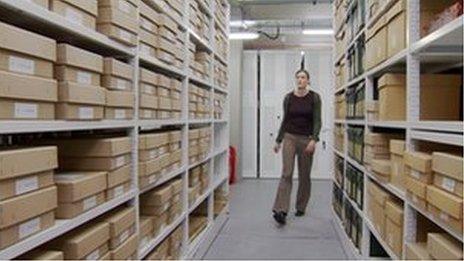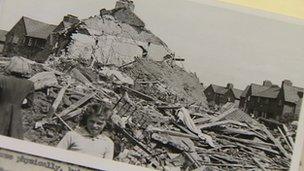Hull's WWII records put online
- Published

The archive contains thousands of records detailing the city's experience of World War II
Thousands of records detailing Hull's experience of World War II have been catalogued online by volunteers in the city.
The project's 80 volunteers have set up an online catalogue containing 3,500 personnel records of the city's civil defence workers.
People wanting to find out further details of life in the city during the war, when it suffered some of the heaviest bombing in Britain, can use it to direct them to more detailed records at the Hull History Centre.
The full archive covers the civil defence personnel cards as well as war damage records, gallantry awards and victory celebrations.
Bombing raids killed and seriously injured thousands of Hull's inhabitants during 1939-45, with hardly a house undamaged in the city.
It suffered the country's first daylight raid of the war in June 1940 and the last daylight land raid towards the end of the war in March 1945.
Heaviest raids
The majority of air raids on the city took place during 1940 and 1941.
During the heaviest raids on 7/8 May and 8/9 May 1941, more than 200 people were killed each night.
Hull suffered numerous air raids because it was a port, easy to find, and German aircraft flew over it to other targets such as Sheffield, Liverpool or Manchester.
Local historian Alan Brigham said: "The Humber estuary and the River Hull made the city a very easy target to navigate to and planes could be back over water in minutes."
The authorities were seriously concerned about the effect of heavy bombing on the civilian population, but Hull did not crack and the raids produced many examples of heroism.
Victoria Oxberry, the project's archivist, said the records contained extraordinary detail.
There are more than 200 files from the city engineer about air raid shelters, including three files about the shelters' sanitary arrangements.
Miss Oxberry has also been moved by the personal stories contained in the records.
Defending the city
She highlighted the story of Thomas Richard Gale of Escourt Street, Hull, who crawled into a "severely demolished" house in Carden Avenue, to rescue a woman and two children during 1943.
Despite the state of the bombed house, rescuers thought they could hear voices.
Ms Oxberry said: "He tunnelled through the rubble by hand and rescued the woman and one of her children, he then went back in for another child and came out crawling backwards while carrying a child."
Mr Gale received the British Empire Medal for his action, Miss Oxberry said.
"The records show how many of the citizens of Hull were involved in defending the city," she added.

Mr Taylor said the city's experience was the "defining period" of 20th Century Hull
Sylvia Wilson, one of the project's volunteers, has had her memory jogged by cleaning the records.
She was a child during the war and remembers a bomb falling near the Anderson shelter she was taking cover in.
"A bomb fell at the back of the field near the shelter I was in and the Anderson just cracked across the back, it was really horrific," she said. "In the shelter next door was my aunty and the roof collapsed in.
"A high percentage of the people in that shelter were killed and my aunty lost an arm."
Martin Taylor, the city's archivist, said: "The city's experience during the Second World War was the defining period during the history of 20th Century Hull and it's still living with the legacy."
- Published1 March 2012
- Published7 May 2011
- Published5 May 2011
- Published5 May 2011